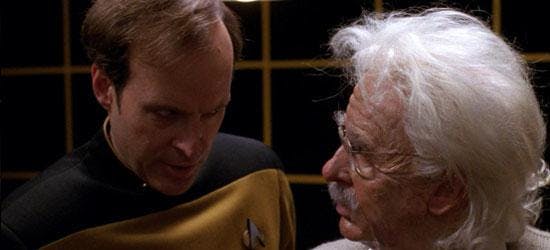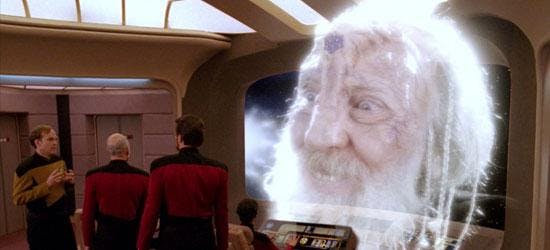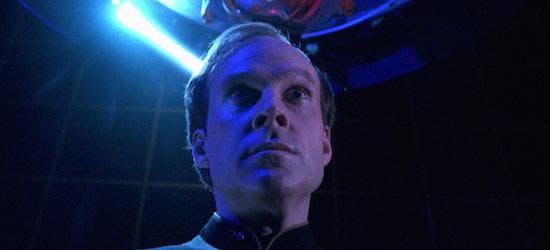Published Jan 4, 2015
TREKNOSIS: This Is Your Brain On Upgrades
TREKNOSIS: This Is Your Brain On Upgrades

Stardate 44704.2: On their way to repair a mysteriously malfunctioning subspace telescope called the Argus Array, some of the USS Enterprise NCC 1701-D's senior officers attend a performance of a scene from Cyrano de Bergerac put on by the good Dr. Crusher and Lieutenant Reginald "Broccoli" Barclay. It quickly becomes obvious that Barclay -- recovering holodeck fantasy life addict and all-around awkward guy -- isn't exactly Royal Shakespeare Company material, but they applaud his efforts at self-improvement nonetheless.
Arriving at the Argus Array, the Enterprise discovers a mysterious alien probe that zaps Lt. Barclay with an unknown form of energy before being destroyed. Soon after, Barclay becomes an astonishing genius, whose achievements include:• Coming up with brilliant ways to boost the ship's shields three times over and fix the Argus Array in a fraction of the time it would normally have taken• Giving a Cyrano performance so nuanced and incredible it moves Dr. Crusher nearly to tears• Debating grand unification theory with a holodeck-generated Albert Einstein• Making an exceptionally suave and subtle pass at Counselor Troi, in whose presence who he usually has trouble speaking coherently.

Eventually, things get a little out of hand: as part of his attempt to fix the Argus Array, Barclay invents a machine that ties his super-advanced brain directly into the ship's computer. Fearing the worst, the crew tries to stop him -- but a mysterious Barclay-summoned subspace distortion swallows the ship and transfers it to the center of the galaxy in an instant. Once there, they discover Barclay's enhancements were put in place by a benevolent race of curious aliens who just needed his help to bring the Enterprise to their front door so everyone could say “hi.” After a fruitful cultural exchange, Barclay's brain gets put back to normal and everyone carries on with their lives.

Who among us hasn't wanted a moment like this in their lives at least once: to be literally the smartest person in the room, able to conceive almost infinite possibilities and fully explore each of them in a nanosecond -- to perceive the universe as a single, simple equation? Will it ever happen? Maybe. Scientists at the Research Institute of the McGill University Health Centre may have taken the first step down that road by discovering a way to unshackle the potential of the human memory. They've identified a protein in the brains of mice (dubbed “FXR1P” for “Fragile X-Related Protein 1”) that seems to inhibit the production of molecules needed to form new neural connections -- mostly memories. Take FXR1P away, and those molecules are free to go ballistic: suddenly, the mice are able to remember more things and recall them better.
The McGill researchers hope the same effect can be found in humans, which may mean we've found a way to take the brakes off our brain's ability to form and retrieve memories. Not only that, but they think FXR1P and other molecules related to it might be useful for specific neural conditions: we might be able to decrease the amount of activity in precise areas of the brain as a treatment for autism, or enhance neural functioning to combat Alzheimer's disease. What if you could pop a pill that gave you perfect, total recall forever? No more fumbling around for people's names, or facts you learned in class, or the title of that one song from that movie with the guy? You know.
This research does raise an interesting question: what's FXR1P doing there in the first place? What possible reason could there be for a molecule designed to prevent you from having an amazing memory? Is there something we don't know about the dangers of having really good recall? Evolution is an experimenter, not a designer, which makes tracing the origins of existing features and functions highly inconvenient; we may never know.
But that's not the only interesting question: what if it turns out there's a similar molecular model going on for the rest of the brain's functions? Are there other proteins lurking in your brain that are keeping you from forming other kinds of neural connections? Are there unseen inhibitors keeping a lid on your logical reasoning or creativity? Suppose we figure out a way to remove those? Maybe we can all be Reginald Barclay in genius mode; when the day comes, let's agree to skip building neural scan interfaces, though, shall we? Laser beams that never stop stabbing you in the head just aren't a good look.

-----
Jon Sung is a contributing writer for XPRIZE and copywriting gun-for-hire to startups and ventures all over the San Francisco Bay area. When not wrangling words for business or pleasure, he serves as the captain of the USS Loma Prieta, the hardest-partying Star Trek fan club in San Francisco.
XPRIZE is an innovation engine. We design and operate prize competitions to address global crises and market failures, and incentivize teams around the world to solve them. Currently, we are operating numerous prizes, including the $30M Google Lunar XPRIZE, challenging privately funded teams to successfully land a robot on the Moon’s surface, and the $10M Qualcomm Tricorder XPRIZE, challenging teams around the world to create a portable, wireless, Star Trek-inspired medical device that allows you to monitor your health and medical conditions anywhere, anytime. The result? Radical innovation that will help us all live long and prosper. Sign up today to join our mission, be a part of our campaign and win collectibles at: tricorderfederation.org.





